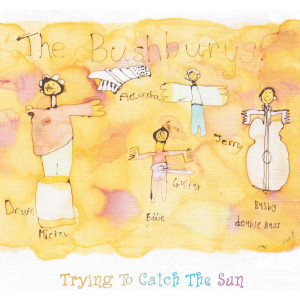 The Bushburys were formed in 1994 as The New Bushbury Mountain Daredevils. Since then they have been touring extensively and released seven albums, of which this is their sixth.
The Bushburys were formed in 1994 as The New Bushbury Mountain Daredevils. Since then they have been touring extensively and released seven albums, of which this is their sixth.
Though they are an English group you can easily detect American influences on the record. Sometimes they come close to country, sometimes the songs sound like Woody Guthrie and there are one or two songs that could easily have been written by early Paul Simon. The instrumentation varies, always with a very strong emphasis on the acoustic, including lots of acoustic guitar, some banjo, accordion and a drummer who is more of a percussionist than a drummer. But in spite of the changes you always recognize the sound as the Bushburys.
First of all there is Eddie Morton’s voice, strongly reminding you of someone… but you can’t tell who. Then there is the simplicity of the songs. Often based on an easy formula: verse-chorus, or verse-chorus-middle-eight with just three or four chords, the Bushbury approach is to give the listener the song, not to show off with their own musical abilities.
They always create a laid back and relaxed feeling in both their songs and their performances. Simple and tasteful are key words here. This is music for the cool down phase late at night, after the party, not for the buzz of the party itself, or for a lazy Sunday afternoon. And it works very well.
Sometimes you get the feeling this could have been a solo album. With Eddie Morton writing most of the songs, singing them, and providing the acoustic guitars and banjos on the backing tracks, this could as well have been a Morton album with friends backing him up.
The CD contains 15 songs and if you are making your first acquaintance with it take my advice and start with the fourth track. The first three are not bad at all, but things start cooking with “Walton Hill.” With uilleann pipes it is something that could have been fetched from a late Planxty album: slow, emotional and stunningly beautiful. Then comes “Camille,” a stand-out track with mandolin and accordion giving it a jolly country feel. And do not miss the Shakespeare quote in the song. “Never Know What You’ve Got” carries on in the same vein, with a lyric about how you have to lose something to really appreciate it.
“Union Jack” showcases the banjo as the main backing instrument. “When We Were Young” is a laid back ballad about missing the past with Morton sounding like Steve Gibbons when he sounds like Bob Dylan. “Wild English Rose” starts slowly and then turns into the best chorus on the album. There is some lovely fiddle playing on it by Lucy Collinge-Hill, stated as a guest musician on the cover but as a member on the web-page.
“The Vision” is a return to the Irish inspirations, again with some lovely instrumental breaks. The verses are just Morton’s double tracked vocals and his guitar. The treatment brings back memories of Silly Wizard or Patrick Street at their best — it is another standout track. “Playing Chess Games in the Park” is very much Paul Simon inspired with some guitar picking that could have been taken right of “Parsley, Sage, Rosemary and Thyme.” And again it is just Morton, his voice and guitar. Things cool down again with the last four tracks.
Trying to Catch the Sun is a good album by anyone’s standards, but it takes time to get into it. The disc was spinning in my CD player for about a month before I felt ready to sit down and write this review. But give it time and you will be rewarded. The only thing missing is a lyric sheet.
(Masc Productions, 1999)
